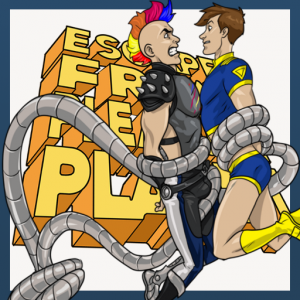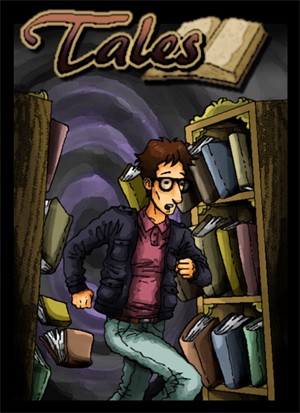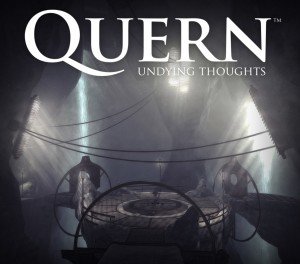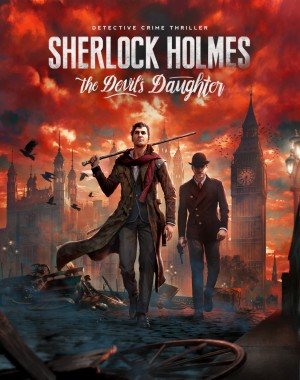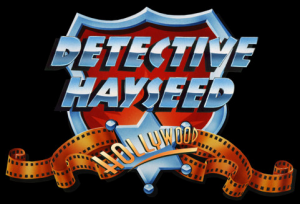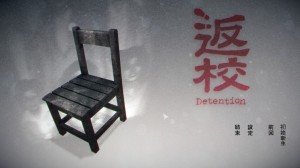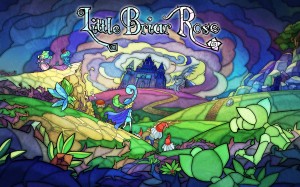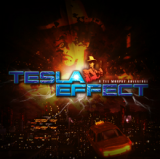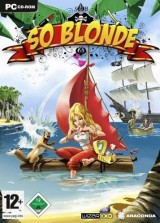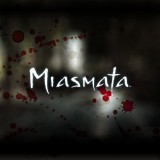Review for Escape from Pleasure Planet
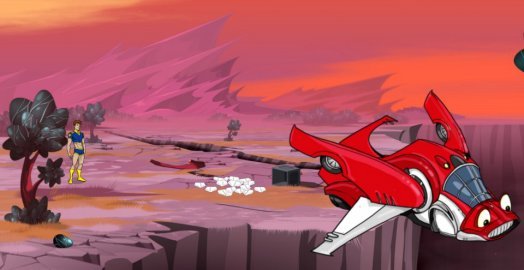
Video games… the final frontier. At least in terms of progressive portrayals of same-sex orientation in entertainment media. While literature, movies, and television have been integrating homosexual characters for years and years, even specifically aiming content at the LGBTQ community, video games acknowledge them only rarely. Enter Australian indie development studio, Up Multimedia, with their classic point-and-click adventure, Escape from Pleasure Planet. The game overtly features characters and various facets centered on the gay experience, but rather than waving a rainbow-colored political flag in your face, it presents its cast as likeable heroes, its situations in an endearing if not wholly entertaining way. Sadly, like its title suggests, much of the potential pleasure to be found escapes through some questionable gameplay elements mucking up what could otherwise have been an enjoyable sci-fi adventure.
The game is a sequel to 2014’s My Ex-Boyfriend the Space Tyrant, though it works as a standalone experience. Players take control of Captain Tycho Minogue as he follows the trail of the interstellar villain Brutus Maximillius. In addition to crashing a wedding, Brutus has stolen a dangerous piece of technology, and it’s up to Tycho to save the galaxy from complete annihilation. As best as I can tell without having played its predecessor, there are a few characters and references to the crew’s previous adventure strewn throughout Pleasure Planet – for example, Tycho carries a shamanistic mask in his inventory throughout the game, which he never uses for anything, and only briefly refers to as a leftover from a previous mission when it’s examined – but the plot doesn’t rely on familiarity with the first outing to be comprehensible.
Unfortunately, it also doesn’t succeed in being very enjoyable either. After a brief firefight between Tycho and Brutus’s ships, the captain follows the ne’er-do-well to the notorious Pleasure Planet, where he loses the trail amongst the salacious thrill seekers who frequent the planet’s facilities, a place where a person’s deepest, most private desires can be lived out in virtual reality stasis pods. Brutus escapes into one of the thousands of anonymous VR pods, and the only way to flush him out is to track down the facility’s three founders, scattered to distant places in the galaxy, and with their help shut down the facility and force Brutus out of hiding.
The premise seems solid enough but quickly becomes stale, and there is very little rhyme or reason to the narrative flow beyond the rote “find this person, solve their task, unlock the next location” manner of progression. From the outset, Tycho is suspicious of the Pleasure Planet, convinced that places like this always hide a dark and terrible secret. The facility’s three founders, too, fled in horror after witnessing something unspeakable when it went online. But what this might be is never expanded upon. There is no dark truth to uncover, despite all the promises to the contrary, and this red herring just ends up forgotten as a confusing ending plays out.
Progressing through the game requires a mixture of solving inventory-based puzzles and beating several unwelcome minigames. Of the latter, some are tedious in their execution, like the Mastermind code-breaking board game, while others are sprung on the player without any explanation of how to best them, such as being forced to use logic punch cards to reprogram a computer maze. Some even have solutions that break the fourth wall, forcing you, the player, to physically interact with the game in a specific way rather than being solved through the playable protagonist.
The problem with all of these, apart from the fact that they’re just not fun, is that the game’s opening act builds up the expectation of a more conventional point-and-click adventure, then continuously throws curveballs at you without properly preparing you for them. The computer-reprogramming bit, in particular, is unfair, as it is unsolvable until you give up in frustration, leave the area, and discover (only if you left at just the right step within the puzzle) that the solution is handled from a different area altogether. After a while, I knew to expect more minigames every so often throughout the 5-6 hour game, but without exception, each one just became more and more awful. While the majority do involve some puzzling, in at least one case the minigame is purely reflex-based. There are also several times when Tycho can actually die, like fully depleting his oxygen tanks trying to propel towards an asteroid floating in space. When this happens, you better hope you’ve saved recently, because the game will simply send you back to the title screen. With no auto-save feature, be ready to repeat some sections over again.
The constant shifting of rulesets also applies to some of the point-and-click sections, specifically those that take place within the VR pods. Each time Tycho enters one of these holotubes, he appears in someone else’s fantasy. The developers make liberal use of the freedom from constraints of universal logic whenever the game switches to a VR setting, which means players are on their own to figure out the odd rules of each world. For example, in a fantasy that takes place in a locker room just before the big game, opening certain lockers before walking to the next screen triggers their corresponding characters to appear. Closing the lockers again causes them to disappear again, and throwing a towel over an open locker door (perhaps as some sort of locker room “code”?) affects whether the character is clothed or hitting the showers. Finding the right combination and order to make characters appear at the appropriate location is a needless game of trial-and-error that doesn’t add any enjoyment whatsoever to the experience.
The actual puzzles are, for the most part, based around Tycho’s inventory, and he has a handheld bicorder (accessible via the on-screen interface) with which he can scan objects in the environment, or even himself for any alien pathogens as a little “in” joke. (“Always know your status!”) The obstacles themselves are neither too easy nor too hard, like keeping a precariously-balanced spacecraft from tumbling off a cliff face or finding a way to cut to the front of the queue while waiting to get into the Pleasure Planet’s holo chamber. There is no hotspot indicator to help locate items or interactive objects, though a feature in the menu does mark navigation points on-screen.
When starting Pleasure Planet, I was expecting something a bit different given its subject matter. As it turns out, the sexual aspect is extremely tame and often understated, and the developers deserve praise for their tasteful approach to the content. I was ready for a comically raunchy romp a la Leisure Suit Larry, but old Larry Laffer was a heck of a lot more lurid than anything on display here. Outside of being able to have Tycho strip down and take a splash in a river or fountain (with any potential nudity comically covered by the environment), only to have him comment on how odd and out of context it seems, there is very little here that would cause even the most conservative eyebrows to waggle, unless one is offended by some gratuitous short shorts and leather outfits. On the contrary: I wanted the game to raise the bar just a bit more, injecting more ribald humor into the proceedings. Still, the messages presented during its VR vignettes, or by characters like the drag queen singing sensation Bazzarella, are positive and affirming. Unfortunately, outside of Tycho, who is a lighthearted but single-minded hero, the supporting cast has little going for it in terms of being fully realized characters.
Other than the frequent changes in play styles, this game could pass for a traditional third-person adventure. The graphics are bold and bright, and characters are nice enough to look at: Tycho and his crew sport a goofy Navy uniform consisting of cutoffs and crop tops, and the alien races are portrayed in colorful ways. Brutus himself will make appearances during Tycho’s VR segments, always appearing in some new form, such as a serpent or a leather jacket-wearing werewolf, always sporting his trademark rainbow mohawk. Some of the environments do feature interesting elements, like when a crash-landing inside an asteroid cave (in a mandatory Star Wars reference) sees Tycho suspended from the ceiling while a giant mutated mouth filled with razor-sharp teeth sprouts from the floor to chomp on him. On the whole, however, the settings are rather limited in scope. Most locations don’t span more than three or four screens, and two entire planet areas consist of only a single screen. Animation covers the bare-bones elements like walking, but much of the action is achieved either off-screen or indicated with dialog boxes.
The game’s music is also somewhat on the underwhelming side, with nothing standing out as particularly memorable. Songs range from acceptable to acoustically painful – the title screen features a track that sounds like an android gerbil that has been chucked into a meat grinder. When I wasn’t busy not noticing the background score, I was actively looking for the Volume Down button during some particularly jarring musical moments. There was no real reason to leave it up, either, as voice acting is entirely absent.
One thing that really compounded the problems inherent in Pleasure Planet’s frustrating gameplay and underwhelming story – at least in my experience – were its technical flaws. These issues ranged from the mundane to the bizarre. Starting the game or restoring a save required a lengthy load screen (up to several minutes at times!), though for the life of me I can’t figure out why, with a presentation that couldn’t possibly be very taxing to my system. Stranger still was the game’s odd penchant to slow down during any kind of animation or dialog boxes unless I rolled my cursor around on-screen. While moving the pointer, all background effects and text boxes scrolled at their normal speed, but even the smallest in-game movement slowed down ridiculously without my cursor intervention. Other glitches reared their ugly heads here and there, like two simultaneous music tracks overlapping each other on the load screen and a music track seeming to skip back and forth, creating a choppy and discordant beat.
Escape from Pleasure Planet is one of the few games attempting to hone in on an underrepresented thematic niche, which is very laudable. However, while it incorporates its homosexual elements very tastefully, it isn’t nearly as successful at being an enjoyable game. Hindered somewhat by technical shortcomings and a lackluster story, what really sinks the deal are the inconsistent, sometimes unfair, often frustrating or joyless changes in gameplay that force players to participate in filler tasks that are poorly explained, if at all. What results is an experiment that has a praiseworthy premise but falls short of providing any actual fun. I’d like to see Captain Tycho Minogue return for more galactic exploits, but this isn’t the game to cause his star to rise.
WHERE CAN I DOWNLOAD Escape from Pleasure Planet
Escape from Pleasure Planet is available at:
We get a small commission from any game you buy through these links (except Steam).Our Verdict:
The ideas behind Escape from Pleasure Planet are more impressive than its execution. As it stands, the game needs refinement to push its LGBTQ themes more to the forefront of the video game landscape.


